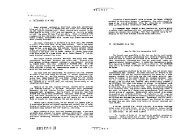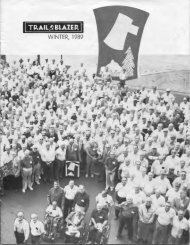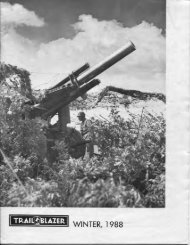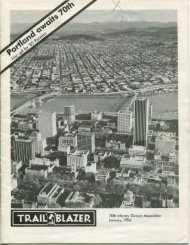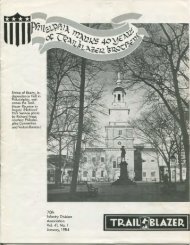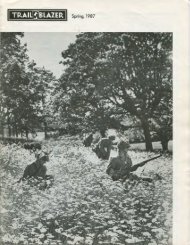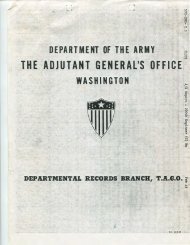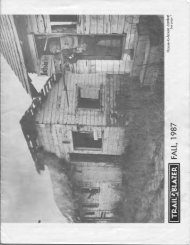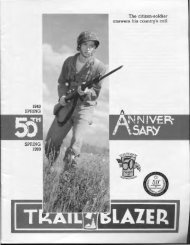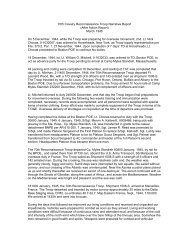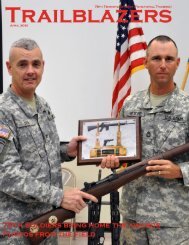Download - 70th Infantry Division Association
Download - 70th Infantry Division Association
Download - 70th Infantry Division Association
Create successful ePaper yourself
Turn your PDF publications into a flip-book with our unique Google optimized e-Paper software.
usually had a doctor back there. They would bring the wounded back and look at them and if they could<br />
give any temporary aid they would do that. If the person was serious and needed further medical<br />
treatment, they would put that person in an ambulance in a convoy and ship them to another hospital.<br />
That meant they went from a tent to a building where they had facilities for surgery.<br />
They kept the Battalion Aid Stations as close to the front lines as possible so they could give aid as soon<br />
as possible. The hospitals where they performed surgeries were further back in regimental areas which is<br />
four battalion o. The ones that were really bad off were evacuated from the area and usually sent to a<br />
place like England where there were regular hospitals. If the hospitals in England were not equipped to<br />
take care of a particular injury, the person was shipped back to the States. It was possible that if you were<br />
wounded on the front line, within a matter of seven days you could be in a hospital bed in Indiana or<br />
Cleveland, Ohio. They would rush you right to the rear and keep you right on moving until you got to the<br />
facility that could help you.<br />
On January 23, we again had quite a few wounded and we were transferring people back and forth. The<br />
position we held was getting some wounded while sitting on the front.<br />
By the 25th of January we transferred three sergeants to the 45th <strong>Infantry</strong> <strong>Division</strong> and, of course, had<br />
many men transferred to the general hospital from the sick battalion. When we went up that gangplank<br />
the previous December, we had 190 men and six officers. I can tell you from reading the reports that our<br />
T. 0. (technical operation) strength was down considerably. I can remember when this occurred.<br />
Theoretically, we should have had 12 men to a squad. At times you might be down to only 3 men per<br />
squad. Where you had 40 or more men to a platoon, you might be down to only 12 men. We were getting<br />
down to the bare minimum where we were not functional. We could not stand an attack.<br />
On January 16, we had to take eight enlisted men and transfer them to task force Herren, which was a<br />
special task force, a combat unit. Now, we were really hurting. My First Sgt. Manuel Figeira got a battle<br />
field commission and was appointed to Second Lieutenant. Richard Schummacher was promoted from<br />
Tech Sgt. To 2nd Lt., and we had two platoon sgts. and one 1st. sgt. who were battle field commissioned<br />
to 2nd Lts. and transferred to the second replacement depot in Thaon, France. They took them to the<br />
rear, pinned on their gold bars, read them the articles of war and then sent them back to the outfit. They<br />
were gone several days. This procedure made several openings in our outfit now, because we were short<br />
of non-commissioned officers. Also, on January 27th, fourteen men were transferred to Company A of the<br />
276th <strong>Infantry</strong> Regiment. They were peeling our outfit down and we had practically no one left. It was also<br />
at this time we had a man by the name of Robert Toomey listed as AWOL (as of 7:15 January 26).<br />
Toomey was later cleared of those charges when it was determined that he had been taken as a prisoner<br />
of war.<br />
They were using our outfit as replacement personnel for those lost or killed in other outfits in our regiment<br />
and soon we were down to a handful. Yet, troop morale was indicated as good and we were digging in.<br />
The third platoon, which was a supporting platoon of our company, laid protection wires from our left flank<br />
to E Company which was on our right flank. This wire was called constantino (concertina – ed.) wire,<br />
barbed wire entanglement that the Germans would encounter if they attacked. The wire was strung from<br />
company to company. The third platoon also cut timber for the first, second and weapon platoons to<br />
improve fox holes. We were digging our holes deeper and getting timber on our roofs. We were getting<br />
ready to sit for a while and defend our action because we were going it alone. Nobody was going to help<br />
us and everybody was getting excited about this deal now, wondering what's going to happen. Somebody<br />
was getting ready to do something.<br />
January 28th we were taking casualties in our outfit and we had three guys taken back to the 19th<br />
headquarters 23rd general hospital. We were sending guys to the hospital and still sending out patrols at<br />
8:00 in the evening to observe Forbach, France. The report stated the mission was accomplished at 1:00<br />
in the morning; all the E.M. returned and no enemy activity observed. When I read a report like that, it<br />
sounds like the patrol crossed through our lines, went out so far, laid down on their bellies and stayed<br />
awhile. The enemy was out there and they just didn't want to go out any further than they had to, with the<br />
intention of putting in their time and avoiding a shooting match with the enemy. I don't know this, but I am



